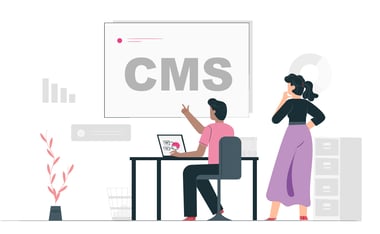An informative and engaging corporate website is important to drive business growth for B2B. Choosing the right Content Management System (CMS) is particularly important to enable you to build and manage the website quickly even with limited technical knowledge and resources. In this blog, we are going to share some tips on how to choose the right CMS system for your business.
What is CMS?
Content Management System (CMS), is a software solution that allows users to build and manage a website without having to code it from scratch or know how to code at all.
With a CMS, you can easily create, manage, modify, and publish content in a user-friendly interface. You can also grant multiple users working in the back-end of the same tool with different access rights — and much more.
Things to consider choosing CMS for your business
It is important to select the right CMS to fit your business’ needs. Critical factors to consider:
- Ease of use
Whether the platform is easy to use to allow the content updating and sharing efficiently. - Deployment Infrastructure
This includes the platform’s flexibility, performance, and scalability of the CMS platform. - Design Flexibility
Whether the platform supports responsive mobile design that provides a seamless experience to your users. - Security
This is to keep your site safe from DDoS attacks and hackers, you need to choose a trusted and secure CMS platform. - The breadth of Features
This is to make sure the CMS functionalities meet your business needs, no matter out of box features and or other available plugins and add-ons.
HubSpot vs WordPress
For the B2B website CMS, HubSpot and WordPress are the most commonly used. WordPress is a popular open-source CMS that provides users with a platform to build on with custom solutions. While HubSpot CMS is a cloud-based CMS that is an all-in-one solution offering a website builder, hosting, domain name registration, marketing tools, and more. Let’s take a closer look at these two CMS solutions.
Let’s take a closer look at the two CMS solutions on different aspects:
Content Creation
|
HubSpot |
WordPress |
|
|
Template editor |
✓ |
✓ |
|
Drag-and-drop form creation |
✓ |
✓ |
|
SEO optimizer |
✓ |
Requires additional software |
|
A/B testing |
✓ |
Requires additional software |
CreationWebsite
Website
|
HubSpot |
WordPress |
|
|
Hosting |
✓ |
Additional subscription or software needed |
|
Content Delivery Network(CDN) |
✓ |
Dependent on hosting provider |
|
SEO optimization |
✓ |
Requires additional software |
|
Competitor tracking |
✓ |
Requires additional software |
|
Multi-language content management |
✓ |
Requires additional software |
|
Personalized content |
✓ |
Additional subscription or software needed |
Security
|
HubSpot |
WordPress |
|
|
Firewall / VPN |
✓ |
Requires additional software |
|
Intrusion Detection System (IDS) |
✓ |
Requires additional software |
|
Web Application Firewall (WAF) |
✓ |
Requires additional software |
|
Distributed Denial of Service (DDoS) Mitigation |
✓ |
Requires additional software |
|
Pro-active scanning and network testing |
✓ |
Requires additional software |
|
Secure Sockets Layer (SSL) Protection |
✓ |
Requires additional software |
For a more detailed comparison, you can find HubSpot vs. WordPress Detailed Comparison here.
Choosing the right CMS is an important decision that helps you to grow your business. You need to consider carefully which platform best meets your specific needs. With the right tool, you should of course have the right methodology to make sure the website projects more agile and effective. If you’re looking for developing or redesigning your website, talk to our specialist to understand more!


